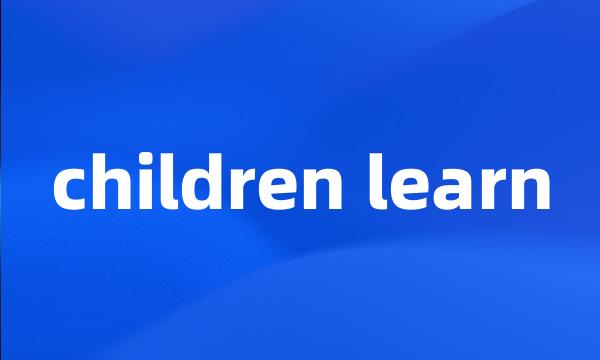children learn
- 儿童学习(或认识到)
 children learn
children learn-
Children learn to act with strength and love .
儿童学习如何利用力量和爱来行动。
-
The scientists created an experiment that mimicked how young children learn new words .
这一研究的科学家设计了模仿儿童学习新单词的一项试验。
-
In some countries children learn to print when they first go to school .
在有些国家,儿童刚上学时学习用印刷体书写。
-
Games can help children learn to form letters .
游戏可以帮助儿童学会组合字母。
-
The book is about how children learn .
这本书是有关小孩怎样学习的。
-
It is not surprising that children learn to read at different rates
小孩子识字的速度不同,这不足为奇。
-
Children learn in mixed ability classes and move up a class each year .
孩子们在学生能力参差不齐的班级学习,每年升一级。
-
In nearly all British state junior schools , children learn in mixed ability classes .
几乎在所有英国国立小学里,孩子们都在能力水平不一的混合班学习。
-
The children learn singing , dancing , drawing , and the like in the kindergarten .
孩子们在幼儿园里学习唱歌、跳舞、画图画等。
-
Children learn to use computer programs by trial and error .
孩子们通过反复摸索才学会运用计算机程序。
-
Children learn faster than adults .
孩子比成人学得快。
-
Children learn by imitation .
孩子们是通过模仿学东西的。
-
We need to help our children learn how to best work with smart computers to improve human decision-making .
我们需要帮助孩子学习如何最大程度地使用智能计算机来提高人类的决策能力。
-
Common research has long held that talking themselves through a task helps children learn , although doing so when you 've apparently matured is not a great sign of brilliance .
长久以来,一般研究都认为完成一项任务时自言自语有助于孩子的学习,当你明显已经成年时还这样做则不是有才华的表现。
-
Viewing childhood development as a scientific investigation throws on how children learn , but it also offers an inspiring look at science and scientists .
将儿童发展视为一项科学调查有助于研究儿童如何学习,同时也能为科学和科学家提供了一个启发性的视角。
-
Some psychologists suggest that young children learn about more than just the physical world in this way --- that they investigate human psychology and the rules of language using similar means .
一些心理学家认为,幼儿通过这种方式学习的不仅仅是物理世界,他们还用类似的方法研究人类的心理和语言规则。
-
Let children learn to judge their own work .
让孩子们学会判断自己的工作。
-
Let the children learn what all educated persons must learn , how to measure their own understanding , how to know what they know or do not know .
让孩子们学习所有受教育者必须学习的东西,学习如何衡量他们自己的理解力,如何知道他们知道或不知道的东西。
-
In the same way , children learn to do all the other things without being taught — to walk , run , climb or ride a bicycle .
同样,孩子们不用教就能学会做所有其他事情——走路、跑步、爬山或骑自行车。
-
Children learn reading and writing at school .
孩子们在学校学习阅读和写作。
-
Young children learn how to speak by imitation .
儿童通过模仿学说话。
-
It 's a teacher 's business to make children learn .
教师的职责是促使孩子们学习。
-
Some children learn English easily , and others with difficulty .
有的孩子学习英语很轻松,而有的很困难。
-
Why is it important to distinguish how children learn ?
为什么认清孩子的学习方式如此重要?
-
It 's important that children learn to understand the concept of sharing .
让孩子们明白分享的概念很重要。
-
Children learn from watching their parents interact with one another .
孩子们通过观察父母来学习与人交往。
-
Your children learn English very well ?
你的孩子学习英语很好吗?
-
Experiments on the Characteristics of How Children Learn Literal Language
幼儿书面语言掌握特点的实验研究
-
Children learn the way to put on shoes by rhyme .
通过儿歌幼儿学习自己穿鞋。
-
Little children learn by analogy . They use what they know in a new situation .
小孩用类推的方法学习,单一反三。
